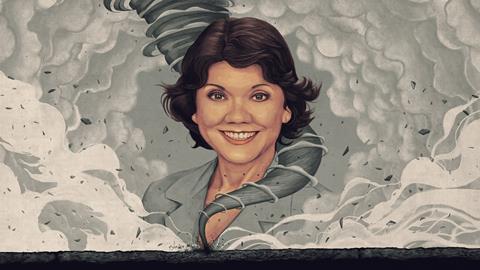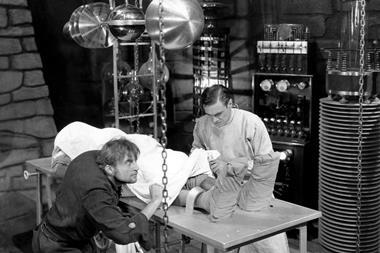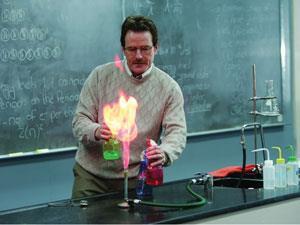The well-known organic chemist on growing up in a small Oklahoma town, asking demographic questions and advising a hit television series

Donna Nelson is a University of Oklahoma chemistry professor and former president of the American Chemical Society (ACS). Her research has focused on nanoscience, communicating science to the public, chemical education, and scientific workforce development. Nelson initiated a namesake series of surveys in fiscal year 2002 that collected data to quantify the representation of women and minorities among science and engineering professors at research universities and received the National Organization for Women’s ‘Woman of Courage’ Award in 2004.
My childhood in a small Oklahoma town was happy. My father was the only doctor in the town, as was my grandfather before him. Our town was at a fork of a major river which, when dammed, created one of the largest man-made lakes in the world at the time. There was boating, fishing, water skiing and other lake activities. I learned how to slalom and to ski backwards.
I had planned to be a doctor since grade school. However, when it was time to declare myself a pre-med major, my father discouraged it. He told me to think about the sacrifices he made to be a ‘good’ small-town doctor. He delivered babies in the middle of the night in the country where walking to the house one might see a wolf, a snake or even an occasional bobcat or cougar.
Many chemistry courses were required for the pre-med option, so by that time I had almost enough chemistry to earn a bachelor’s degree in chemistry, including the additional courses needed for ACS [American Chemical Scoiety] certification. It would have been silly to switch that late to another major.
Because of my rather late decision away from med school, I had no plans for after college. A professor who obtained his PhD at UT-Austin with Michael Dewar steered me to graduate school, offering to write me a good recommendation letter. I drove there to meet Professor Dewar without an appointment. He spent half the year in England but happened to be in in his office when I arrived. He accepted me into his group on the spot, even though I hadn’t yet applied.
I have Cherokee, Chickasaw, Choctaw and Osage blood. I’m not a quarter of any one tribe, and my ancestors did not sign up as members on any tribe’s base roll.
I became interested in the mismatch between the representation of demographic groups at PhD level versus in assistant professors of Stem departments at research universities. This prompted me to survey department chairs to determine headcounts of their tenured and tenure-track faculty disaggregated by discipline, race, rank and gender, starting in fiscal year 2002.
A friend emailed me a message he had received from a US National Science Foundation rotator who wrote: ‘Those Nelson diversity surveys are really shaking things up around here.’ The name for my surveys was born, and they have had a huge impact.
We collected data for the top 100 departments in 15 different science and engineering disciplines. The other disciplines were comparators for chemistry, demonstrating that chemistry had the greatest mismatch. This generated much publicity, many speaking engagements, many awards, and significant grant funding, including one grant for $1 million.
Opportunities may not come along very often
Being the science advisor to the TV show Breaking Bad was so much fun. In C&EN, I read an interview with the show’s producer Vince Gilligan near the end of season one. He said he would appreciate constructive comments from a chemically inclined audience. I asked the person who wrote the article to get a message to the producers that I would volunteer. They asked for help with reviewing scripts, pronouncing certain words, suggesting what to put on the blackboard in a high school chemistry class.
It was a fabulous experience. After I appeared in their credits, other shows similarly asked me for advice, including The Big Bang Theory, The Godfather of Fentanyl and Twisters.
My advice for students who go into science is to shoot for the moon, and you might hit Mount Everest. Have high goals and you’ll be more likely to accomplish something significant. Also, don’t let other people discourage you. Every important project I ever did had people telling me along the way that my idea wasn’t good, that it couldn’t be done, or that I couldn’t do it.
When you recognise an opportunity, seize it. Don’t sit back and wait, because opportunities may not come along very often. I asked Vince how many volunteers came from his published interview I read, which had been mailed to 167,000 ACS members. He smiled and replied: ‘One’.
I ran for ACS president shortly after Breaking Bad ended in the US in fall of 2013. ACS had just changed rules so that student members could vote in the elections, and when I went to the national meetings students recognised me and followed me. It seemed like the Pied Piper. As I walked along, a group of about 20 students collected behind me; whenever I paused, they approached me and asked for a selfie or an autograph on their programme.
Three of us were on the ballot for ACS president and I won. I think that the student votes helped. One of my friends who was also running told me that a student had asked him: ‘Are you running against that Breaking Bad lady?’ When he said yes, the student said: ‘Oh, you’re going to lose.’

















No comments yet